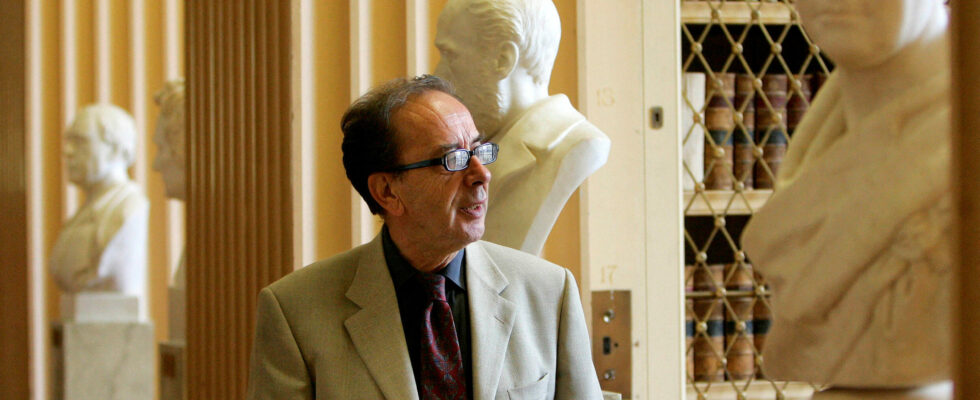Compared to the Italian masters Dante Alighieri and the Russian Osip Mandelstam, Ismail Kadaré was Albania’s greatest writer. A slayer of totalitarianism and its horrors through a protean and world-famous work, the writer died on Monday, July 1, in Tirana, at the age of 88.
5 mins
Literature ” gave me everything I have today, she was the meaning of my life, she gave me the courage to resist, the happiness, the hope to overcome everything “, so spoke the Albanian Ismail Kadaré, who died this Monday of a heart attack, in his home in Tirana. The man was 88 years old and was considered one of the most important European writers of our time. He was the winner of many prestigious awards, including the Man Booker International Prize (2005), the Prince of Asturias Award (2009) and the Neustadt Prize (2019). His name was regularly mentioned in recent decades for the Nobel Prize in Literature, which he will never receive, but he leaves behind an immense literary legacy.
It is a monumental work, that of Kadaré, composed of around fifty works, including novels (The General of the Dead Army, The Palace of Dreams, Discord), collections of poems (Red Pashas) and memories (Twilight of the Steppe Gods), essays and theatre. Translated into some forty languages, his novels tell, through myths and metaphorical stories, the horrors of totalitarianism which raged in his country under the communist dictatorship. Communist hell, like any other hell, is suffocating. “, this modern-day Dante told AFP in one of his last interviews.
” Stone City »
Kadaré was born on January 28, 1936 in Gjirokastër, a city in southern Albania, which has served as the setting for many stories by the Albanian master under the name of ” stone city “. It turns out that Gjirokastër was also the birthplace of the dictator Enver Hoxha, the “ Europe’s last Stalinist tyrant “, who ruled Albania with an iron fist between 1945 and 1985 and from whom the writer drew inspiration to analyze and dissect the mechanisms of tyranny and domination. How can we be surprised then that the ” stone city » occupies a prominent place in this author’s fiction and stories?
Kadaré said that it was through reading that he got into writing. According to legend, it was by discovering Macbeth by William Shakespeare in the family library that he became aware of his vocation as a writer and wrote his first verses at the age of 12. Also a great admirer of Aeschylus, Cervantes, Dante and Gogol, he studied literature in Tirana, then in Moscow where he went to study at the Maxim Gorky Institute in the late 1950s. The writer recounted in his memoirs how, by wiping the slate clean of the teachings of his Moscow teachers, he found his own literary idiom. This one was closer to magical realism than to socialist realism, which was very fashionable at the time in the communist world.
First novel and exile in Paris
Returning to Tirana in the early 1960s, Ismail Kadaré entered professional life as a journalist, while continuing to write. In 1963 he published his first novel, The General of the Dead Army, which made him known and permanently established his reputation as a modernist and committed storyteller. He is 27 years old. This novel, which will be adapted for the cinema, depicts the fortunes and misfortunes of an Italian officer sent to Albania to exhume his compatriots killed during the Second World War. Combining the grotesque and the epic, the novel recreates the twilight atmosphere that reigned in Stalinist Albania at the end of the Second World War.
Albania, its people, its landscape and its autocratic and corrupt leaders were the main source of inspiration for the prolific work of Ismail Kadaré. Considered a subversive writer by the communist regime in power in Tirana, while his stories were favorably received abroad, the author quickly found himself marginalized in his country.
How ” do a normal work of literature, in an abnormal country » : this is the question that Kadaré then asks himself. Subjected to constant state surveillance and feeling threatened by a power that is constantly on the lookout, he goes into exile in 1990 in Paris, where his work has found a favorable echo for at least two decades. Wasn’t France the first foreign country to translate his first novel?
During his Parisian years, he developed his habits at the Rostand café, inspiration for his novel Mornings at Café Rostand. In 2017, he was the guest of Catherine Fruchon-Toussaint, in the show Littératures sans Frontières on RFI, for this release of his book, Revenant returned to coffee, which he considered to be a symbol of freedom.
Albanian writer Ismaël Kadaré talks about cafés, institutions in Tirana and also symbols of freedom
After the fall of the Albanian dictatorship following the disappearance of the Soviet Union in 1991, the Albanian writer shared his life between Paris and Tirana. Tempted for a time by politics, he never took the plunge, contenting himself with making his voice heard through literature, because, as he liked to say, “ literature is my greatest love, my only one; the greatest incomparable with anything else in my life “.
Five essential titles by Ismaïl Kadaré
- The General of the Dead Army (novel, 1970)
- Chronicle of the Stone City (1973)
- Broken April (1980 novel)
- Invitation to an official concert and other stories (short stories, 1985)
- Red Pashas (poetry, 1975)
